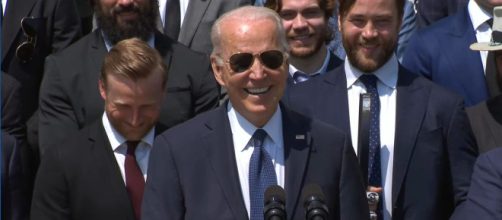U.S. President Joe Biden is set to begin a four-day visit to South Korea and Japan on May 20, the White House has announced. During his visit, he would meet with leaders of both countries as well as members of the Quad, the White House said on April 27.
"This trip will advance the Biden-Harris Administration’s rock-solid commitment to a free and open Indo-Pacific and to U.S. treaty alliances with the Republic of Korea and Japan," the White House said. It added, "In each country, President Biden will hold bilateral meetings with his counterparts: newly elected President Yoon Suk Yeol of the Republic of Korea and Prime Minister Kishida Fumio of Japan."
The White House said that Biden would also "meet with the leaders of the Quad grouping of Australia, Japan, India, and the United States" in Tokyo.
The entire announcement is on the White House website.
Talks in Seoul on May 21
The meeting between Biden and Yoon would take place on May 21, ten days after Yoon was sworn in as president of South Korea, the Yonhap News Agency said. The meeting in Seoul would be taking place "as tensions have been running high on the Korean Peninsula" following the resumption of North Korean missile tests, the news agency said. As a candidate, Yoon had made strengthening the alliance between South Korea and the United States "his top foreign policy goal," the news agency said.
With Kishida in Tokyo on May 23
Biden was scheduled to meet with Kishida on May 23 and with leaders of the Quad on May 24, The Japan Times said.
Sebastian Maslow, a lecturer at Sendai Shirayuri Women’s College, told the paper that Biden would probably try to improve relations between Japan and South Korea. With arrival of a new South Korean president, "there is definitely some momentum for dialogue between Japan and South Korea," Maslow said.
South Korea and Japan in Biden's Indo-Pacific Strategy
The importance of relations with South Korea and Japan was mentioned in Biden's Indo-Pacific Strategy of the United States, released by the White House in February 2022. The document stressed the importance of the U.S., South Korea and Japan cooperating "closely through trilateral channels" to address the threat posed by North Korea.
"Beyond security, we will also work together on regional development and infrastructure, critical technology and supply-chain issues, and women's leadership and empowerment," the document said. It added that the U.S. would strive to have all three countries "coordinate our regional strategies in a trilateral context." The entire document can be downloaded from the White House website.
The Quad meeting on May 24 would bring Biden and Indian Prime Minister Narendra Modi together at a time when the Americans were hoping India would openly oppose Russia's War in Ukraine, The Japan Times noted.
Writing in The Wall Street Journal, Tarini Parti said India's neutrality was "partly born of necessity" as Russia was India's biggest source of armaments.
India viewed Washington with suspicion but had "an abiding confidence in Moscow’s reliability" built on decades of experience, Parti said.
Biden's Indo-Pacific Strategy called for supporting "India's continued rise and regional leadership." The document said the U.S. sought "a strategic partnership" with India for the promotion of "stability in South Asia" and "a free and open Indo-Pacific."


